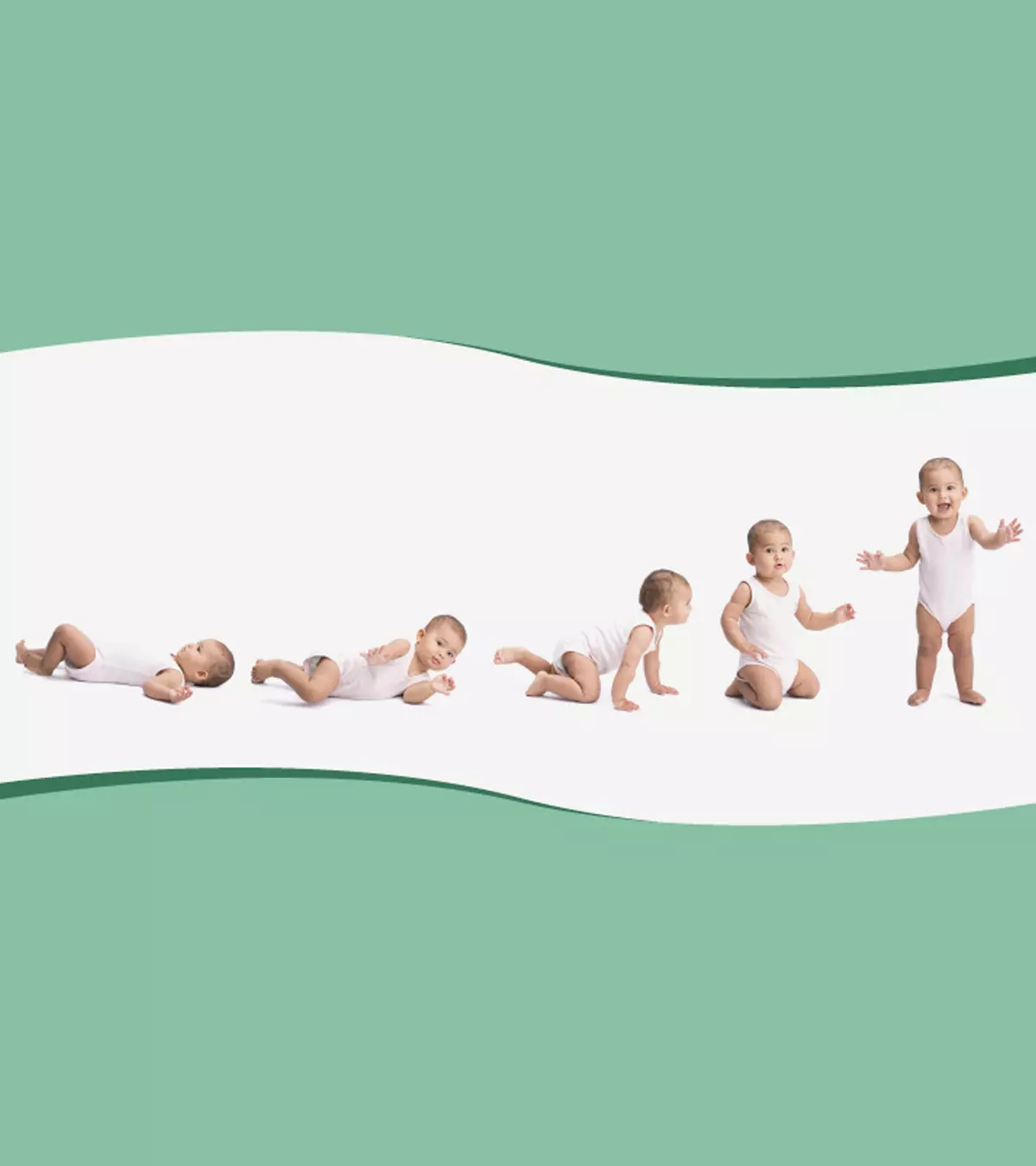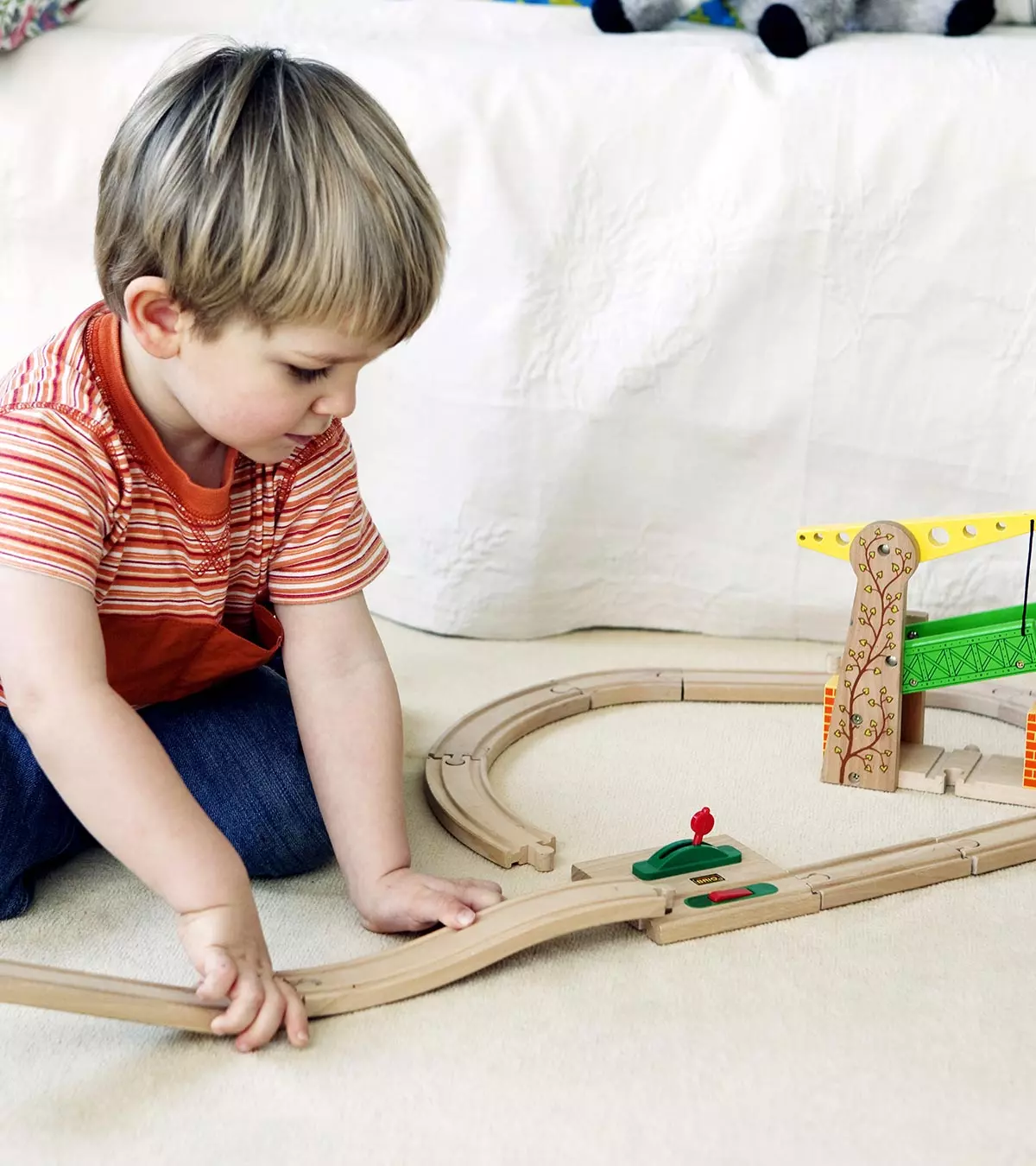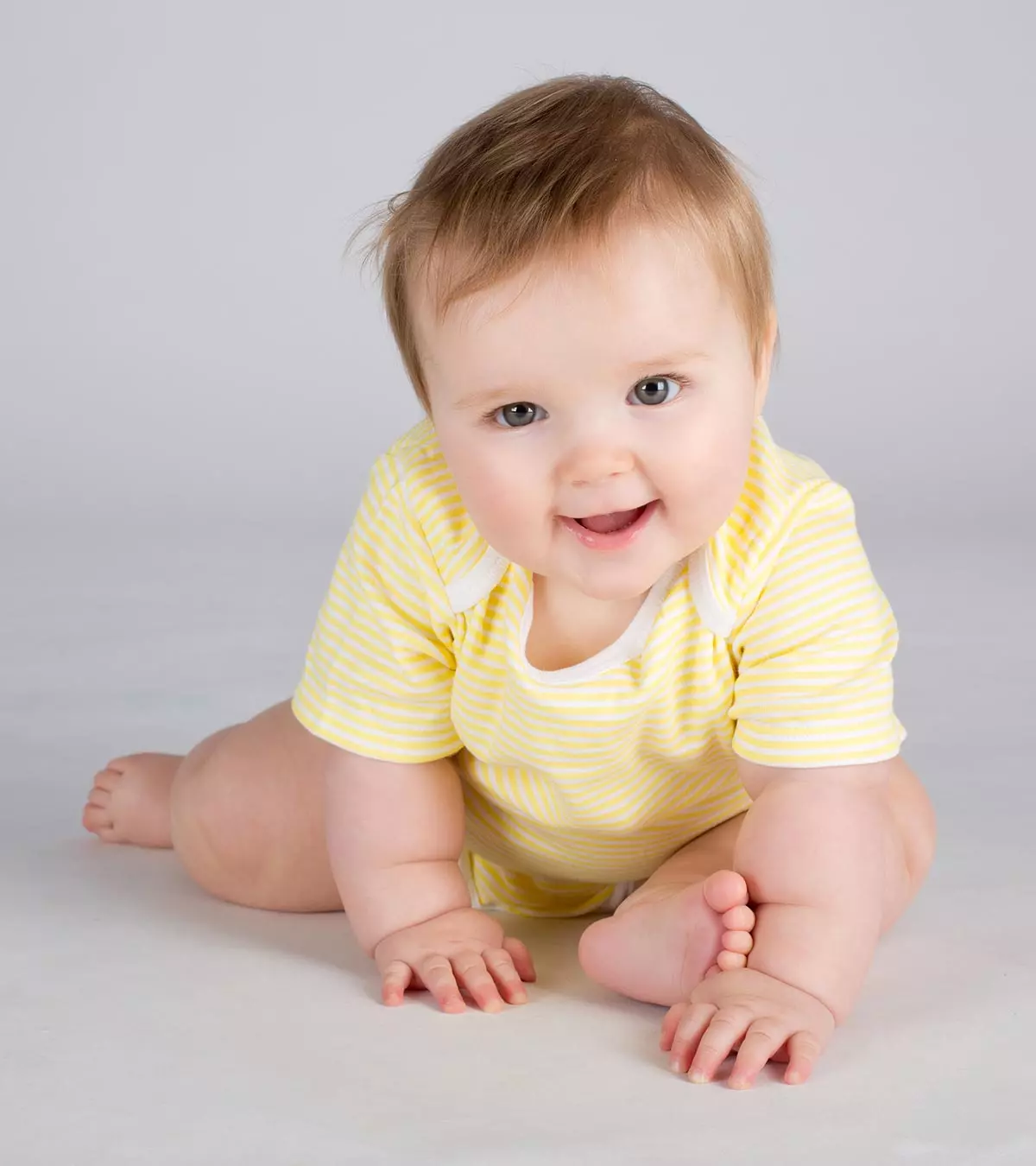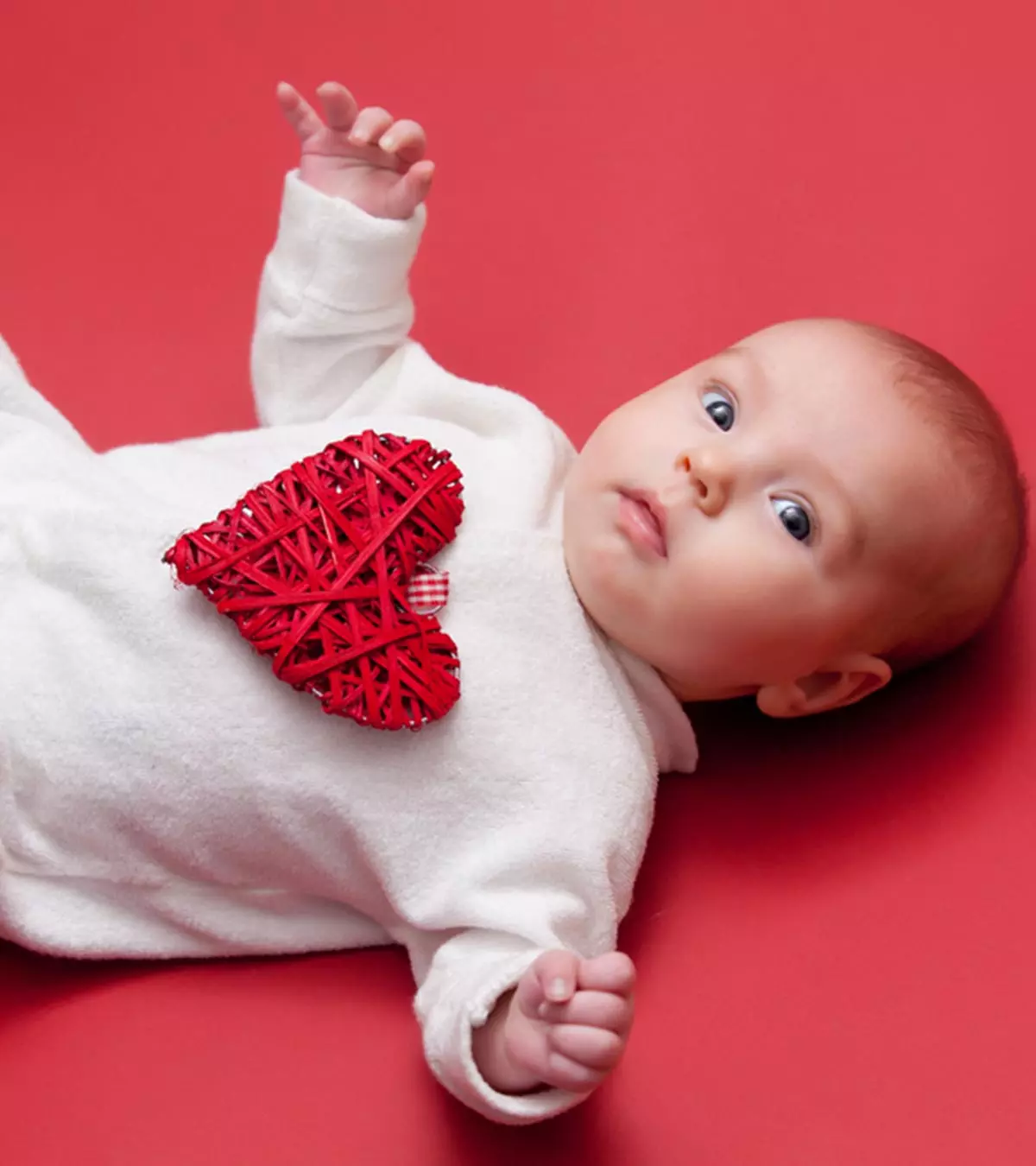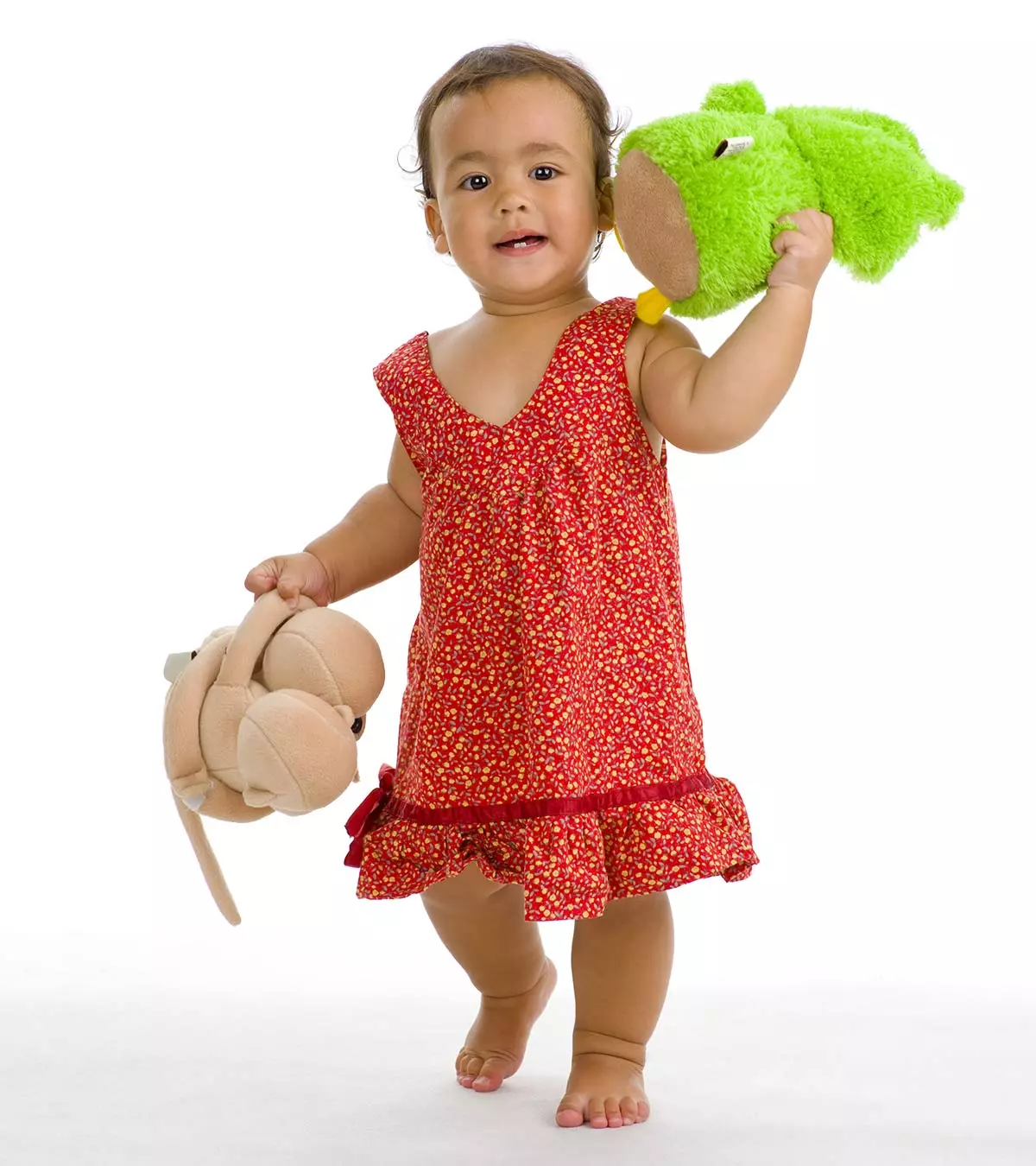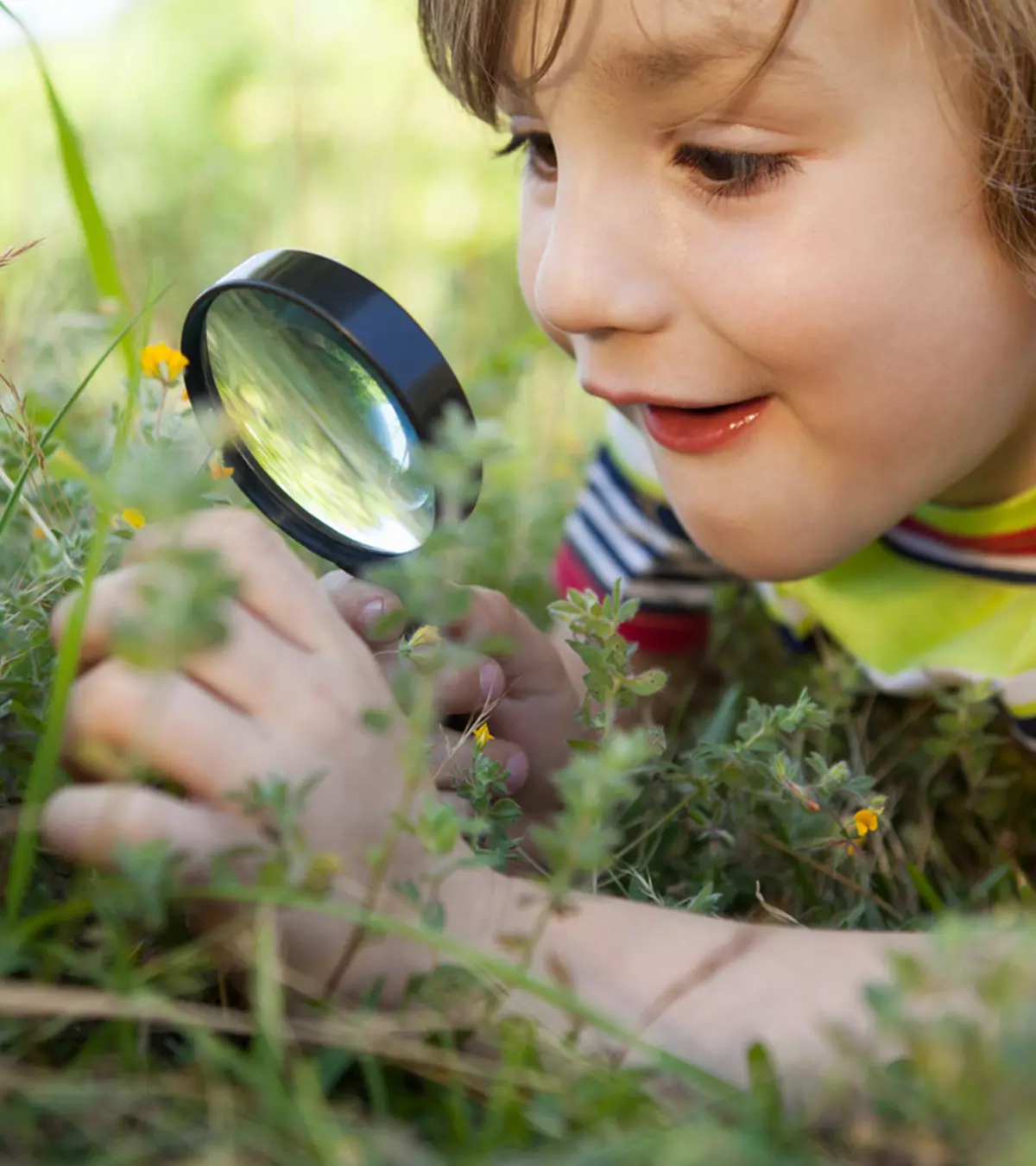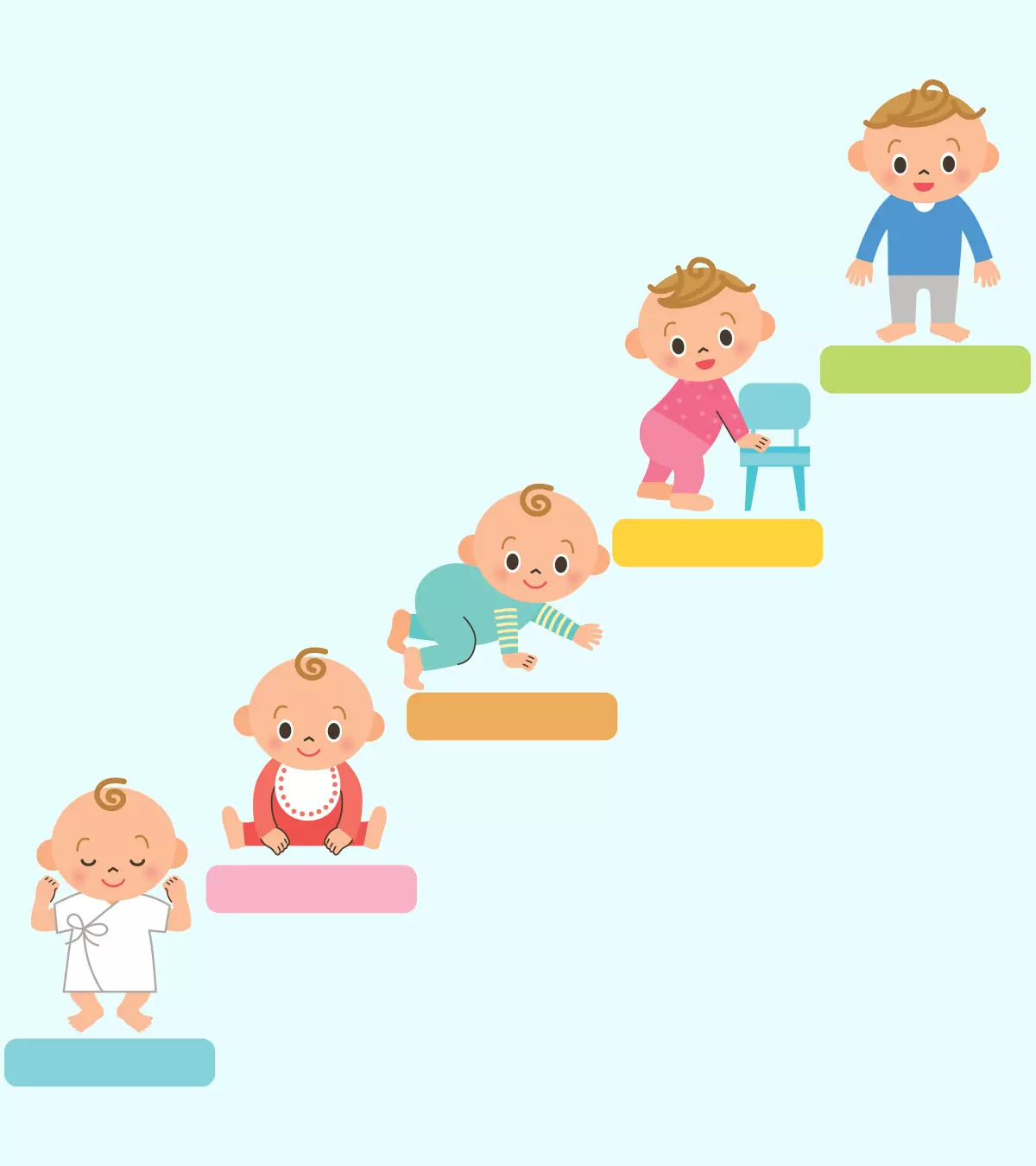
Image: Shutterstock
Your baby is a quarter away from their first birthday at nine months.

A 9-month-old baby can crawl, but they may also stand with assistance. They have a lot of surprises in store for you, like for the first time calling you “mama” and “dada.”
Babies also go through various crucial changes that indicate their positive growth at this age. As your baby starts moving around, baby-proofing your home and scheduling regular health check-ups are crucial. These steps promote their growth and give parents peace of mind.
This post acquaints you with the nine-month-old baby’s developmental milestones pertaining to their physical, mental, social, and emotional growth.
Key Pointers
- A 9-month-old baby is usually capable of copying gestures, saying basic words, crawling, and sitting without support.
- They may experience separation anxiety and prefer to play with familiar faces.
- If a child does not attempt to crawl, sit, recognize familiar faces, or make any sounds, it is important to consult a pediatrician.
- Reading to a baby, taking them outdoors, and allowing them to play and explore can aid in achieving their developmental milestones.
9-Month-Old Developmental Milestones Chart
| ACHIEVED DEVELOPMENTAL MILESTONES | EMERGING DEVELOPMENTAL MILESTONES |
|---|---|
| Crawls for a shorter distance and then sits | Will crawl faster and for longer distances |
| Stands with support | Will step forward holding a support |
| Says basic words such as “mama” and “dada” | Will speak more basic syllable words |
| Understands “no” | Can interpret simple words such as “yes”, “come” and “go” |
| Copies simple gestures | Will repeat a wider range of actions and gestures |
| Eyes have depth perception | Depth perception will improve to see farther objects |
| Holds and drops objects by will | Will give an object when requested |
| Has favorite toys | Will have favorite toys and people |
| Moves objects from one hand to another | Can put objects into a container |
| Gets nervous around strangers | May get nervous or be shy around strangers |
9-Month-Old Baby’s Developmental Milestones
The developmental milestones can be categorized into three categories – cognitive, physical, and social and emotional. Each category has its set of individual accomplishments.
Cognitive Development:
The milestones pertain to the baby’s analytical thinking, judiciousness, and general mental prowess.
- Copies gestures and sounds: It takes a certain amount of cognitive ability to copy a gesture or repeat a sound, and at nine months, a baby is able to do so (1). When a parent looks at the baby and asks them to make a gesture or a sound, the baby understands it is directed towards them.
Sarah Philips, a mother and a freelance writer, shares a milestone in her baby’s ninth month. She says, “This week we’ve taught our little one that the horn on the bus goes ‘beep beep beep,’ and it brings me a stupid amount of joy when she plays along (i).”
- Makes basic syllable sounds:They not only copy sounds but also repeat those and other words.
- Understands “no”: The baby realizes that “no” is a negative instruction, and obeys. They discern the purpose of the word and may avoid doing something that elicits a “no” from parents.
- Points at an object or person of interest: The nine-month-old knows that pointing at an object or individual means displaying interest towards it. For example, they may point at a toy or their favorite food item, when they want it. Babies can wave their hands in response to “bye”.
- Loves peek-a-boo or hidden object game: The baby loves exploring and finding objects and people, thanks to their sharpened memory. They know the exact spot where an object is hidden. Babies at nine months have the intellectual development to realize that a hidden object does not disappear but exists in its hiding place. This cognizance is known as object constancy.
 Point to consider
Point to consider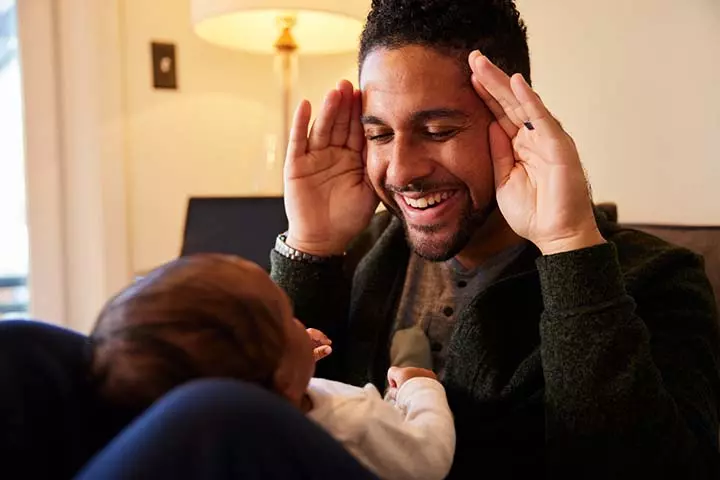
Physical Development:
This encompasses milestones relating to physical growth and gross and fine motor skills.
- Baby crawls: It is the most significant physical development milestone in a baby. By the ninth month, an infant gets into a crawling position easily and crawls effortlessly. It is time to baby-proof the house.
- Sits without support: The infant crawls around and gets into the sitting position. They can sit for a longer time and will love playing while sitting, thanks to the stronger lower back muscles.
- Stands holding a support: The leg muscles are stronger than before and can partially support the body weight. The baby can stand up with support and continue standing by using the support.

- Develops pincer grasp: The index finger and thumb can now touch each other to develop a pincer grasp, which the baby uses to pick small objects (2). This grip is used to pick finger foods and put them in their mouth. Therefore, it is time for you to keep away small objects to prevent a choking hazard.
- Develops the parachute reflex: It is the body’s reflex to put the hands forward when the head faces down. This is the body’s way of preventing a head injury in case of a fall.
- Uses arms and hands: The baby learns to hit toys against each other and clap hands. Babies, at nine months, can not only pass objects from one hand to another but also throw them at short distances.
- Eyes track moving objects: The ocular muscles that control the eye movement are stronger, allowing the baby to track moving objects. They do not lose sight of a moving toy car or a falling piece of cloth, and may as well point at something you accidentally dropped! Due to the improved depth perception, they can judge the distances between objects better than before.
 Quick fact
Quick fact- Sleeps an hour extra at night: On an average, babies sleep for 14 hours a day. They might sleep for fewer hours in the day, but they will compensate for it by sleeping longer at night (3).
Social And Emotional Development:
In addition to cognitive and physical abilities, a baby needs to develop their social bonding, behavioral, and emotional skills too.
- Clingy towards primary caretakers: The little one prefers being close to parents and cries when taken away from them. They enjoy cuddling, smile a lot, and try to please you as well (4).
- Nervous around strangers: When in the company of a new face, the baby will panic and cry. This is called separation anxiety (5). The baby will crawl towards a parent even if the stranger is friendly and playful.
- Shows favoritism among toys: You may notice that they play with a particular toy more in spite of a new toy around. This is because around nine months, the preferences for specific items peak.
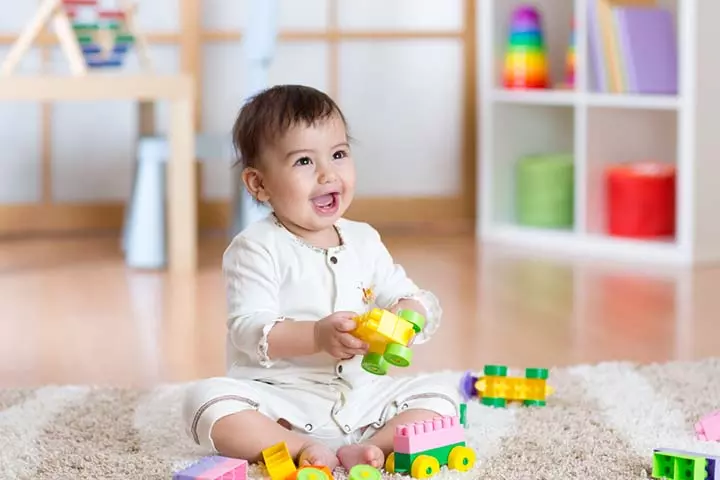
- Loves spending time with familiar faces: The baby is at their merry best when in the company of parents and other primary caretakers like grandparents. They now understand that their caregivers make a single unit, which we know as family. It is with them that the baby will always find food and security. For this reason, family time is now fun since the baby is joyful and always ready to play the next game.
While these are some of the major developmental milestones in the baby’s first year, remember that each baby is unique and may develop at a different pace.
Nine-Month-Old Feeding Schedule
The CDC recommends that breast milk or infant formula is considered the primary source of nutrition for children between 6 and 12 months old (9). Parents can introduce solid food slowly in small portions as they grow up gradually. Continue reading to get an idea of what the feeding schedule for nine-month-old babies looks like.
- Early morning: Breast milk or infant formula.
- Breakfast: Iron-rich foods like infant cereal, mashed fruits (bananas, pears), and vegetables (cooked carrots, peas).
- Mid-morning snack: Small soft fruit or vegetable pieces, yogurt, or cottage cheese (10).
- Lunch: Mashed or minced family foods, including starchy foods (potatoes, rice), vegetables, and a protein source (meat, fish, eggs, pulses). Remember to avoid salt for babies (11).
- Afternoon snack: Breast milk or formula, with options for small, soft finger foods.
- Dinner: Similar to lunch, with varied minced or mashed family foods, including vegetables, starchy foods, and protein.
- Evening: Breast milk or formula.
- Throughout the day: Continue breastfeeding or infant formula according to the needs of the baby. Offer water in a cup during meals.
Remember that every baby is unique. Therefore, you should tailor food choices and feeding portions to your baby’s stage of growth and appetite. Consult a pediatrician to customize your baby’s food choices and portion sizes based on their unique needs and growth, as nutritional requirements can vary greatly during this stage.
When To Be Concerned?
If there are any shortcomings in the baby’s growth, then it will hinder his current and subsequent development (6).
- Does not sit or crawl: Crawling and sitting are key indicators of healthy development. If the baby is unable to sit or crawl, with or without support, then it points towards a problem and needs prompt medical intervention.
- Cannot stand with support:The baby bears partial weight on their legs and puts the rest on the support. If they fail to stand up in spite of the support, then it is quite likely a sign of developmental delay.
- Does not make any sounds: If the baby is abnormally quiet and doesn’t make any sound at all, then it could indicate delay in their development.

- Fails to recognize familiar faces: At nine months, a baby can recognize familiar faces and acknowledge them with a smile. For example, when a parent returns home from work, the baby will chortle excitingly. Also, their face will light up when grandparents make a visit since they can recollect they had fun with them the last time. A blank expression means they have failed to remember faces. This indicates a missed developmental milestone.
- Unable to hold anything: If the baby does not develop a pincer grasp, cannot hold food and eat by themselves, and has a critically weak grip, then it is quite likely that they have a developmental problem.
A baby undergoing severe developmental delay will also show stiff or droopy limbs, restricted muscle movement, and lack of coordination between the neck and head when the baby is lifted. Early recognition of developmental delays enables timely intervention and better outcomes. The American Academy of Pediatrics recommends parents to get their babies screened for developmental delays.
5 Tips To Improve Your 9-Month-Old’s Development
Here are some simple and useful ways to make your nine-month-old grow in full swing:
- Let the baby play: Play time is the best way to exercise muscles and help them develop at a normal pace. Make sure your little one plays a lot and be a part of it. Give them instructions like “pass the ball to mom” or “throw it there” and point at a spot. Playing together stimulates the baby’s cognitive and physical skills and helps them grow better. Also, encourage playing while sitting up as it strengthens the baby’s back muscles.
- Read books and explore the outdoors: A nine-month-old will love brightly-coloured picture books. Have reading sessions together and read the entire book. This activity helps stimulate the baby’s vision. Strolling in the park is also one of the best activities for a nine-month-old baby, as this helps the baby see many hues of color in nature.
 Do remember
Do remember- Have basic yet meaningful conversations: Point at objects and share their names with the baby (“That’s a sofa”). Show them gestures and say their meanings (“Say Bye-Bye”). Your baby may not repeat the exact phrase, but can remember the sound of the phrase and try babbling.

- Let the baby feed himself: Place various types of finger foods in front of the little one, and let them pick each piece to feed himself. This activity helps the baby practice the pincer grasp, which is a precursor to other types of grip positions that develop in the future. Do watch them, though, to prevent choking hazards.
- Have family time: Spend a day with the entire family. Refer to every person by their relationship with the infant (“That’s aunty”). Acquaint the little one with all the faces, which will help them remember the faces better.
- Engage in interactive learning: Include interactive learning activities, such as sing-alongs or toys that respond with lights and sounds when pressed. These activities help boost cognitive and sensory development.
Frequently Asked Questions
1. Should my 9-month-old be clapping?
A baby usually starts clapping around nine months, but it’s not a cause for concern if your baby has not begun clapping yet. Your baby may gradually learn the skill by the time they turn one year old (7).
2. Should a 9-month-old know their name?
Your 9-month-old baby should ideally react when you call out their name (7). However, some children may achieve this milestone late.
3. Can babies say hi at 9 months?
Yes, your baby may make sounds like ‘hi,’ ‘bye bye,’ ‘bababa,’ and ‘mamma’ by nine months old. However, if your baby doesn’t utter a word even after a year, consider taking the help of a pediatrician.
4. What time should a 9-month- old go to bed?
A 9-month-old should ideally sleep for 11 hours at night and 3 hours during the day. So schedule their bedtime accordingly (8).
5. How many times a night will a 9-month-old wake up?
Waking up a couple of times at night may be expected for children above 6 months (8).
A 9-month-old baby will display several developmental milestones. They will start crawling, sitting without support, and showing certain reflexes. They will also copy sounds and gestures, play peek-a-boo, seem uncomfortable around strangers, and love spending time with known people. Although every child masters these milestones at their own pace, you may consult a doctor if your child does not sit, make sounds, or recognize known people. If you want to enhance your baby’s learning abilities, give them adequate playtime, read to them, and let them enjoy time with the entire family.
Infographic: Ways To Promote A 9-Month-Old Baby’s Development
As your baby grows, they achieve developmental milestones as per their age. For instance, by nine months of age, a baby can stand with support and copy simple gestures, among other milestones. The following infographic presents helpful ways to promote these milestones in the baby.
Some thing wrong with infographic shortcode. please verify shortcode syntaxIllustration: A Guide To 9-Month-Old Baby Developmental Milestones With Tips

Image: Stable Diffusion/MomJunction Design Team
At 9 months old, your baby reaches exciting milestones in their development. You will see them crawl, babble, and explore the world around them. Watch the video to understand more of what you can expect.
Personal Experience: Source
MomJunction articles include first-hand experiences to provide you with better insights through real-life narratives. Here are the sources of personal accounts referenced in this article.
i. Nine Things I’ve Learned in the 9 Months Since Welcoming Our First Babyhttps://medium.com/illumination/nine-things-ive-learned-in-the-9-months-since-welcoming-our-first-baby-c1f67bde3786
References
- Important Milestones: Your Baby By Nine Months; Centers For Disease Control And Prevention
https://www.cdc.gov/ncbddd/actearly/milestones/milestones-9mo.html - Developmental Milestones: Fine Motor Skills and Visual Motor Skills; CHOC children’s
https://www.choc.org/userfiles/file/Rehab-Developmental%20Milestones%20final.pdf - Infant Sleep; Stanford Children’s Health
https://www.stanfordchildrens.org/en/topic/default?id=infant-sleep-90-P02237 - First Year Infant Development; American Pregnancy Association
https://americanpregnancy.org/healthy-pregnancy/first-year-of-life/first-year-infant-development/ - Emotional and Social Development: 8 to 12 Months; Healthy Children; American Academy of Pediatrics
https://www.healthychildren.org/English/ages-stages/baby/Pages/Emotional-and-Social-Development-8-12-Months.aspx - Your baby’s developmental milestones at 9 months. UNICEF.
https://www.unicef.org/parenting/child-development/your-babys-developmental-milestones-9-months - Important Milestones: Your Baby By Nine Months; Centre for Disease Control and Prevention
https://www.cdc.gov/ncbddd/actearly/milestones/milestones-9mo.html - Infant Sleep; Stanford Medicine, Children’s Health
https://www.stanfordchildrens.org/en/topic/default?id=infant-sleep-90-P02237 - How Much and How Often To Feed.
https://www.cdc.gov/infant-toddler-nutrition/foods-and-drinks/how-much-and-how-often-to-feed.html - Feeding Your Baby 6 months to 1 year.
https://www.gov.mb.ca/fs/healthybaby/index.html - Feeding your baby (aged nine months to a year).
https://www.nidirect.gov.uk/articles/feeding-your-baby-aged-nine-months-year
Community Experiences
Join the conversation and become a part of our nurturing community! Share your stories, experiences, and insights to connect with fellow parents.
Read full bio of Dr. Richard Mario Lurshay
Read full bio of Rohit Garoo
Read full bio of Dr. Ritika Shah
Read full bio of Vibha Navarathna





